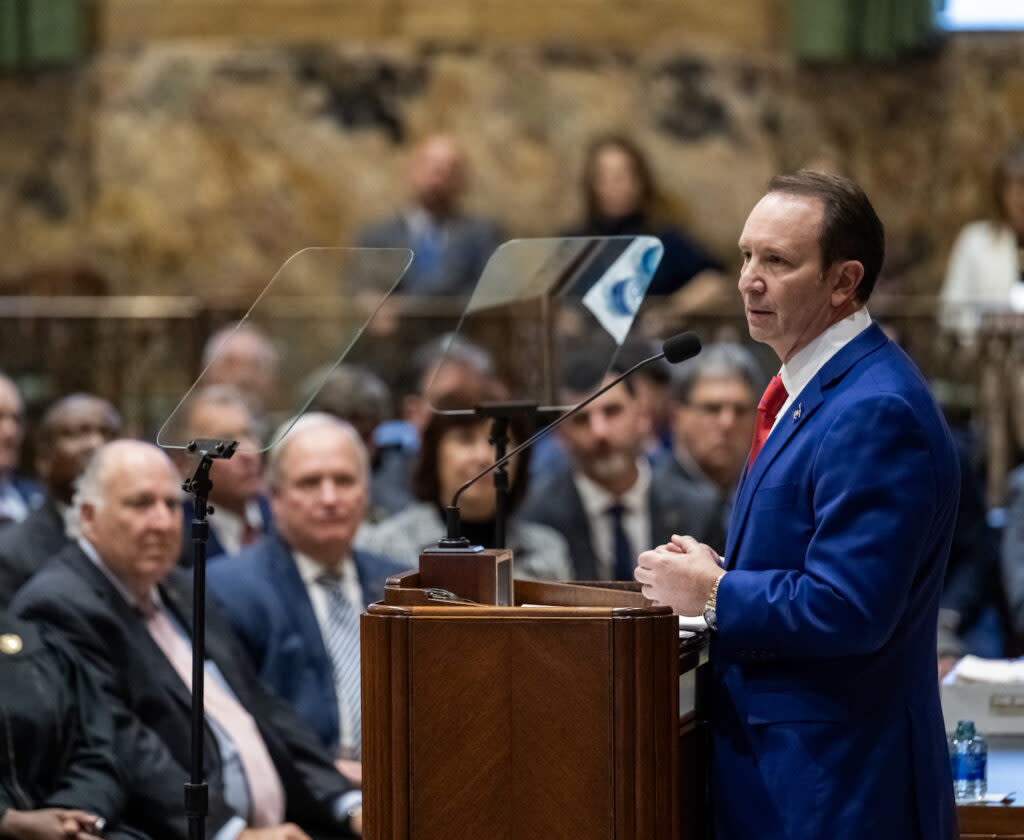Slow down the con-con train

- Oops!Something went wrong.Please try again later.
Gov. Jeff Landry is pushing for a closed primary election system in Louisiana. (Michael Johnson/The Advocate, Pool)
This weekend marks 50 years since Louisiana voters ratified the 1974 state constitution. If Gov. Jeff Landry and his financial backers have their way, it might also be the last time we can celebrate the anniversary of our state’s foundational charter.
With three whole months of governing under his belt, Landry is demanding that state legislators, along with 27 of his hand-picked appointees, convene for a constitutional convention that could have a generational impact on how children are educated, our coast is protected, the taxes we pay and the rights that all Louisianans enjoy.
He wants all of this accomplished in just two weeks – from May 20 to June 3 – and to happen at the same time that the Legislature is wrapping up its work on hundreds of other bills moving through the process.
This rushed convention proposal is a grotesque overreach that doesn’t give ordinary citizens nearly enough time, information or input into what is being done in their name.
The constitutional convention should come as a big surprise to anyone who followed Landry’s campaign for office last fall. Backed by big-money donors and the endorsement of Donald Trump, Landry ran as a genial Cajun who hates crime, loves fossil fuel extraction and would move the state in a more conservative direction.
He barely mentioned the constitution during the fall campaign. And the governor still hasn’t said what he actually wants to change about the state’s founding charter – or why it has to be changed before June 3.
Landry’s legislative allies have tried to allay fears by claiming they simply want to shrink the constitution by taking things out and putting them into law, where they can be changed more easily by a simple vote of the Legislature. They promise a limited convention that will focus on rewriting the articles that govern taxes and spending.
Once lawmakers convene a constitutional convention, however, anything and everything could be on the table for debate. The stakes are pretty major.
The constitution ensures that the state sales tax can’t apply to prescription drugs, groceries and home utilities. The constitution safeguards funding for coastal protection and restoration, so the Legislature can’t raid those funds when there’s a budget crunch. It protects the retirement security of teachers, school bus drivers and other public employees, who don’t pay into the Social Security system and rely on their public pensions to sustain them in retirement.
GET THE MORNING HEADLINES DELIVERED TO YOUR INBOX
The constitution protects funding for public schools, and ensures that state dollars are distributed fairly among school districts through the Minimum Foundation Program formula so that politicians don’t get to divide or divert the money. It protects Medicaid dollars that flow to hospitals and nursing homes, and salary stipends for police, firefighters and other local first responders.
The constitution protects the homestead exemption, which keeps the first $75,000 of your home’s value from being subject to property taxes.
All of these protections could be on the table. Removing these protections from the constitution and placing them in statute makes them vulnerable to change. All it would take to tax your prescriptions, or remove the homestead exemption, is a vote of the Legislature.
The last time Louisiana’s constitution was rewritten was in 1973, and it was a much longer, more orderly and transparent process. Edwin Edwards had just been elected governor, and called for a constitutional convention during his campaign. The Legislature made sure the voters had a voice, passing a bill that called for the election of 105 delegates – one from each House district – in the 1972 elections (the governor, then as now, had 27 appointments).
The convention itself lasted a whole year – from January 1973 to January 1974 – with delegates sometimes meeting five days a week. Landry, by contrast, wants all this business wrapped up in just TWO weeks, starting May 20.
No one would dispute that our constitution has grown long and complex in the last 50 years. The Public Affairs Research Council tells us it’s the fourth-largest constitution in the country – at more than 77,000 words. It’s been amended 216 times in the past 49 years. There is something in there for everyone to hate.
But each of those amendments is there for a very good reason: At some point during the last half century, two-thirds of the House and Senate, and a majority of Louisiana voters, decided that it was worth putting in the state constitution.
People can disagree on whether the constitution should be overhauled – which provisions should stay and what should go. But a process this important shouldn’t be rushed through in two weeks, with no election mandate and no opportunity for the public to weigh in by picking delegates. An undertaking this important deserves at least as much time, scrutiny and public input as the last time.
The post Slow down the con-con train appeared first on Louisiana Illuminator.

